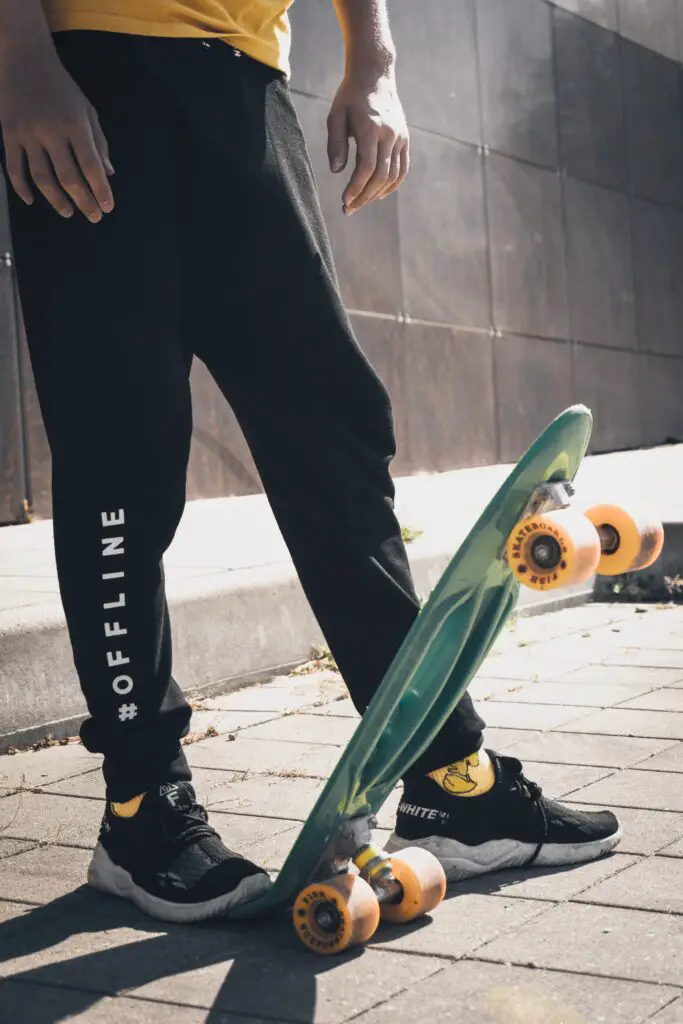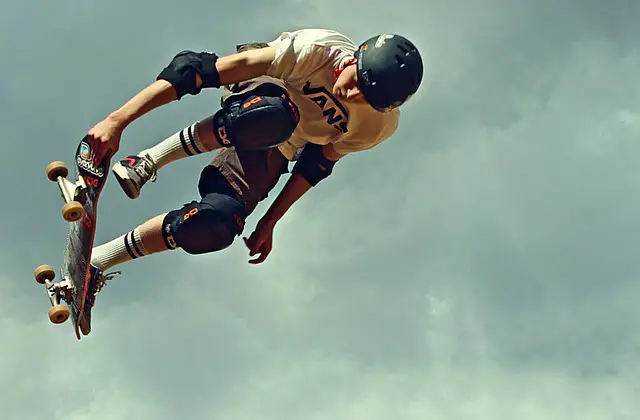To learn skateboarding you can take a few weeks to a few months of depending on dedication and talent. Becoming a proficient skateboarder takes time and dedication. As you gain experience and confidence, you’ll continue to improve your skills over time. Remember, the key is consistent practice and a willingness to learn from both successes and setbacks.
In this article, we will explain the question: “How long does it take to learn to skateboard?” We will provide valuable insights, personal experiences, and a data table to guide you through your skateboarding journey.
- Understanding Skateboarding
- Learning to Skateboard: Basics and Fundamentals
- How Long Does It Take to Learn to Skateboard?
- #1. Previous Experience
- #2. Physical Fitness
- #3. Time Invested
- #4. Age
- #5. Learning Style
- The timeline for learning to skateboard can be broken down into several stages:
- Data Table: Time vs. Skill Level
- Expert Tips for Accelerated Progress
- Tips #1: Consistent Practice
- Tips #2: Safety First
- Tips #3: Seek Guidance
- Tips #4: Stay Positive
- Tips #5: Record Yourself
- Tips #6: Push Your Boundaries
- Bottom Line
- FAQs With Answers about How Long Does It Take to Learn to Skateboard
Understanding Skateboarding
Before delving into the learning process, let’s briefly explore what skateboarding is and its fascinating history. Skateboarding emerged in the late 1940s as surfers in California sought to replicate surfing on land during flat wave days. Over the years, skateboarding evolved into a diverse and dynamic sport, incorporating various styles and disciplines.
Learning to Skateboard: Basics and Fundamentals
Like any other skill, skateboarding starts with mastering the basics. The first step is to choose the right skateboard that suits your style and preferences. Skateboards come in different shapes and sizes, each tailored for specific types of skating.
Understanding the different parts of a skateboard, such as a deck, trucks, wheels, and bearings, is crucial for a beginner. Additionally, investing in safety gear, including a helmet, knee and elbow pads, and wrist guards, is essential to protect yourself from injuries.
How Long Does It Take to Learn to Skateboard?

Mastering the art of skateboarding is an exciting journey, but the timeline for learning can differ from person to person. Several factors influence how quickly one can pick up skateboarding skills. These factors include:
#1. Previous Experience
If you have any background in board sports like surfing or snowboarding, you may find it easier to adapt to skateboarding.
#2. Physical Fitness
Individuals with better balance and agility may progress faster in skateboarding.
#3. Time Invested
The more time you dedicate to practice, the quicker you’ll improve.
#4. Age
Younger learners tend to adapt more rapidly, but skateboarders of all ages can excel with determination.
#5. Learning Style
Some people learn through trial and error, while others prefer structured lessons.
The timeline for learning to skateboard can be broken down into several stages:
Getting Comfortable on the Board
In this initial stage, you’ll focus on developing your balance and getting comfortable standing on the skateboard. Spend time just rolling on flat surfaces and practice shifting your weight from one foot to the other. This stage can take around 1 to 2 weeks.
Basic Pushing and Riding
Once you’re comfortable on the board, you’ll begin learning how to push and ride properly. Practice pushing off the ground with one foot and coasting while balancing on the board. Depending on practice frequency, this stage may last 2 to 3 weeks.
Turning Techniques
Now that you can ride straight, it’s time to learn how to turn. Master basic turning techniques like kick turns and carving. At this stage, you’ll start feeling more in control of the board. Plan for around 2 to 4 weeks of practice.
Introduction to Tricks
As you become proficient in riding and turning, you can start learning some beginner tricks like ollies and manuals. These tricks will require practice and patience, and it may take 3 to 6 weeks to get comfortable with them.
Intermediate Tricks and Advanced Techniques
Once you have a good grasp of the basics, you can move on to intermediate tricks like kickflips and heelflips. This stage is where you can get creative with your skateboarding style. Progressing to this level may take around 6 to 12 weeks.
Advanced Tricks and Style Refinement
At this point, you’re an experienced skateboarder, and you can focus on perfecting more complex tricks and refining your unique style. Becoming an advanced skateboarder can take several months to a year or more, depending on dedication and talent.
Data Table: Time vs. Skill Level
Below is a data table showcasing the average time it takes to reach different skill levels in skateboarding:
| Skill Level | Time to Achieve |
| Beginner | 2-4 weeks |
| Intermediate | 2-6 months |
| Advanced | 6 months – 1 year |
| Expert | 1 year and beyond |
Expert Tips for Accelerated Progress
Tips #1: Consistent Practice
Dedicate regular time to skateboarding, even if it’s just a few minutes every day. Consistency is key to improvement.
Tips #2: Safety First
Always wear proper safety gear, including a helmet, knee pads, and elbow pads, to prevent injuries.
Tips #3: Seek Guidance
Take lessons from experienced skateboarders or attend skateboarding workshops to learn proper techniques.
Tips #4: Stay Positive
Skateboarding can be challenging, but maintaining a positive attitude will keep you motivated and focused on your goals.
Tips #5: Record Yourself
Film your skate sessions to analyze your technique and identify areas for improvement.
Tips #6: Push Your Boundaries
Don’t be afraid to try new tricks and take calculated risks. Pushing your limits is essential for growth.
Bottom Line
Learning to skateboard is an exhilarating journey that requires patience, dedication, and the right mindset. While the time it takes to become proficient varies from person to person, consistent practice and a positive attitude will lead to success. Remember to prioritize safety, choose the right equipment, and seek guidance from experienced skaters. Embrace the learning process, celebrate your progress, and enjoy the thrill of skateboarding. So, grab your board, head to the nearest skate park, and let the adventure begin!
FAQs With Answers about How Long Does It Take to Learn to Skateboard
#Q: How long does it take to learn how to ride a skateboard?
A: The time it takes to learn how to ride a skateboard can vary based on individual factors such as natural aptitude, physical fitness, and dedication to practice. For most beginners, it may take around 2-4 weeks of consistent practice to achieve a basic level of proficiency in riding the skateboard. During this time, you’ll focus on improving your balance and getting comfortable with the board.
#Q: Can you learn to skateboard at 25?
A: Absolutely! You can learn to skateboard at any age, including 25 and beyond. While it’s true that younger individuals might find it easier to pick up skateboarding due to their flexibility and fearlessness, adults can still become skilled skateboarders with dedication and practice. The key is to be patient, stay positive, and enjoy the learning process.
#Q: Is it easier to learn on a long or short skateboard?
A: The choice between a long and short skateboard depends on personal preference and the type of skateboarding you want to pursue. Longboards are generally more stable and easier to ride, making them a popular choice for beginners. They are great for cruising and commuting. On the other hand, short skateboards (also known as trick or street skateboards) are more maneuverable and suitable for tricks and stunts. As a beginner, you may find it easier to start with a longboard for a smoother learning curve.
#Q: What skills should I learn first in skateboarding?
A: As a beginner skateboarder, it’s essential to focus on mastering the foundational skills first. Here are some key skills to learn:
Riding and Pushing: Learn how to ride the skateboard while pushing off the ground with your foot.
Stopping: Practice various stopping techniques like dragging your foot on the ground or using the tail to come to a halt.
Turning: Learn to make controlled turns by shifting your weight and leaning in the direction you want to go.
Balancing: Spend time improving your balance by riding on one foot and getting comfortable on the board.


